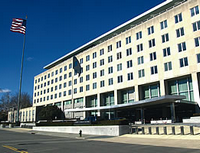The following op-ed has been adapted from the Project for National Security Reform's recently released report (.pdf), "Turning Ideas Into Action." It is the first of three that WPR will be featuring. The second will appear tomorrow.
The current Department of State was not designed to manage the increasingly diverse responsibilities of the U.S. government in a globalized world. While the department occupies center stage of the civilian foreign affairs community, it remains narrowly focused on, and resourced for, traditional diplomacy. It neither possesses nor exercises sufficient authority to manage the full range of international civilian programs effectively.
While there has been a vast expansion of U.S. government representation abroad, accompanied by more complex interactions between these different representations, no correspondingly comprehensive reforms have occurred to ensure that U.S. messages and actions are unified and consistent with overall foreign policy priorities and objectives. While the secretary of state is charged with coordinating all these international activities, in reality, the secretary lacks sufficient authority to carry out this coordination.

